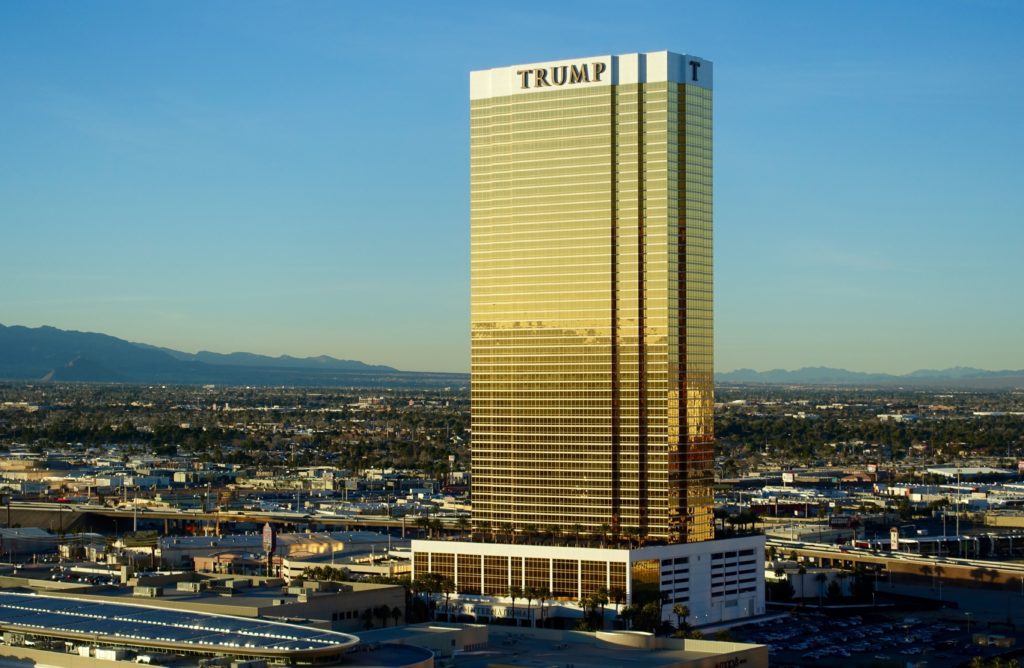Making sure sin city still shines brighter than creation’s dark

In the latest in their series on Trump’s tax returns, the Times finds that Trump was able to get a critical last-minute infusion of campaign funds from an agreement with his partner in his unprofitable Vegas hotel to engage in some of his trademark tax-evading looting:
Donald J. Trump needed money.
His “self-funded” presidential campaign was short on funds, and he was struggling to win over leery Republican donors. His golf courses and the hotel he would soon open in the Old Post Office in Washington were eating away at what cash he had left on hand, his tax records show.
And in early 2016, Deutsche Bank, the last big lender still doing business with him, unexpectedly turned down his request for a loan. The funds, Mr. Trump had told his bankers, would help shore up his Turnberry golf resort in Scotland. Some bankers feared the money would instead be diverted to his campaign.
That January, Mr. Trump sold a lot of stock — $11.1 million worth. He sold another $11.8 million worth in February, and $7.5 million in March. In April, he sold $8.1 million more.
And the president’s long-hidden tax records, obtained by The New York Times, also reveal this: how he engineered a sudden financial windfall — more than $21 million in what experts describe as highly unusual one-off payments from the Las Vegas hotel he owns with his friend the casino mogul Phil Ruffin.
Was this legal? Almost certainly not, either coming or going:
The bulk of the money went through a company called Trump Las Vegas Sales and Marketing that had little previous income, no clear business purpose and no employees. The Trump-Ruffin joint venture wrote it all off as a business expense.
Experts in tax and campaign-finance law consulted by The Times said that while more information was needed to assess the legitimacy of the payments, they could be legally problematic.
“Why all of a sudden does this company have more than $20 million in fees that haven’t been there before?” said Daniel Shaviro, a professor of taxation at the New York University School of Law. “And all of this money is going to a man who just happens to be running for president and might not have a lot of cash on hand?”
Unless the payments were for actual business expenses, he said, claiming a tax deduction for them would be illegal. If they were not legitimate and were also used to fund Mr. Trump’s presidential run, they could be considered illegal campaign contributions.
Given that Trump won the presidency with a last-minute rise in the polls, this wasn’t a minor event!
And now, the quo:
And after the inauguration, Mr. Ruffin would ask for a favor. Would the president help revive a dormant project of great importance to a lot of powerful people in Las Vegas — a bullet train that would whisk gamblers from Southern California to the Strip in less than 90 minutes?
Four years earlier, Barack Obama’s administration had considered, but ultimately decided against, a $5.5 billion loan for the train. Mr. Trump loved the idea, Mr. Ruffin told Forbes in a 2017 interview.
“Obama wouldn’t approve it, but maybe Donald will,” Mr. Ruffin said.
What Mr. Trump did after that is not clear. But around Las Vegas, word of the president’s interest was gratefully received. “Anybody having the president’s ear genuinely — not just to have a meeting and have it fall into an empty basket that is 12 miles deep — I am all in favor of it,” the Las Vegas mayor, Carolyn Goodman, said in an interview.
This past March, a panel composed largely of Trump appointees gave the train company permission to sell $1 billion in tax-free bonds to private investors. Authorities in California and Nevada fell in line, approving additional bonds. Trains could begin running as soon as 2024.
Among the train’s chief beneficiaries will be Mr. Ruffin and the other grandees of gambling who became a vital font of political money for Mr. Trump when he needed it most.
And, of course, Donald Trump himself.
INFRASTRUCTURE WEEK!
I’m beginning to think this Trump character is not entirely on the level. The rest of the story is worth reading, with major roles for Sheldon Adelson and Steve Wynn.


